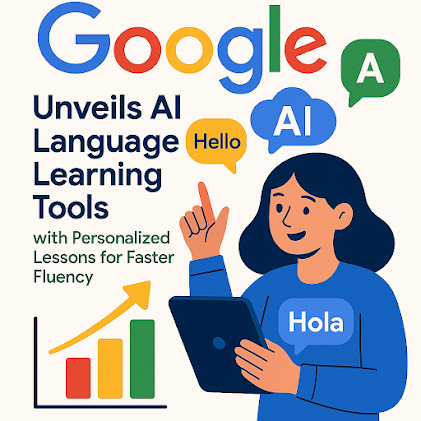What Are Google's New AI Language Tools?
Google has launched a
new suite of AI-powered language learning tools, now available through Google
Labs, aimed at revolutionizing how we learn new languages. Designed for
language learners, educators, and tech-savvy users, these tools use generative
AI to deliver highly personalized lessons in a conversational and engaging
format.
Unlike traditional
apps, Google's approach combines machine learning with real-world scenarios to
help learners understand not just textbook grammar, but also natural speech,
idioms, and regional variations.
This initiative is
part of Google's broader commitment to enhancing educational tools using
cutting-edge AI technologies.
How Personalized Language Lessons Work
To access the tools,
go to Google Labs and sign in
with your Google account. Once inside, you’ll find three AI language
learning experiments, each crafted to address a different part of the
learning journey:
1. Tiny Lesson
This experiment helps
learners find relevant vocabulary, phrases, and grammar tips for any
situation. Whether you're preparing for a trip or learning workplace language,
Tiny Lesson adapts its content based on context.
2. Slang Hang
Slang Hang generates conversational
dialogues between native speakers, teaching users regional expressions,
slang, and idiomatic phrases. It’s ideal for understanding how the language is
actually spoken on the street or in casual conversations.
3. Word Cam
A highly visual
feature, Word Cam allows users to snap a photo of their surroundings and
instantly learn how to describe what they see in another language. It's perfect
for building vocabulary based on real-life context.
Each experiment
provides personalized AI language lessons that evolve based on your
interaction—making language acquisition more intuitive and effective.
Benefits of
Google’s AI Language Learning Platform
Educators and learners
alike will find value in the precision and depth these tools offer. Here are
some standout benefits:
- Real-World Application: Learn practical language for real-life
scenarios using your environment and current needs.
- Contextual Learning: Content adapts based on user behavior,
input, and environment—unlike traditional static lessons.
- Conversational AI: Practice languages with AI by engaging in
dynamic, realistic conversations.
- Visual and Interactive: Especially with Word Cam, visual learning
becomes a core part of the process.
- Free and Accessible: Available via web and mobile through
Google Labs.
Comparison with
Duolingo and Other Apps
Google’s AI tools are
positioned to offer a unique edge over existing platforms like Duolingo,
Babbel, or Rosetta Stone, which often follow a linear, less
adaptive curriculum.
|
Feature |
Google AI Tools
(Labs) |
Duolingo |
Babbel |
Rosetta Stone |
|
Personalized Lessons |
✅ Advanced AI-driven |
✅ Basic adaptive |
✅ |
✅ |
|
Slang & Idioms |
✅ Native-style convo |
⚠️ Limited |
❌ |
❌ |
|
Visual Learning
(Word Cam) |
✅ Real-world input |
❌ |
❌ |
❌ |
|
Free Access |
✅ Through Labs |
✅ (with premium) |
❌ |
❌ |
|
Grammar + Vocabulary
Tips |
✅ Contextual delivery |
✅ |
✅ |
✅ |
Google’s use of
real-time visual and conversational AI provides a more immersive and context-rich
experience.
How to Access
Google's AI Language Tools
Here’s a step-by-step
guide:
- Visit Google Labs on your browser.
- Sign in with your Google account.
- Look for the language learning section
with experiments.
- Choose from:
- Tiny Lesson – for grammar and vocabulary.
- Slang Hang – to learn idioms and regional
expressions.
- Word Cam – to translate and describe your
surroundings using your camera.
- Start learning directly through
interactive, AI-powered modules.
These tools are
currently experimental, meaning they may evolve rapidly and are limited to
select users and languages for now.
FAQs
What languages does
Google's AI support?
Currently, the AI tools focus on learners of English and Spanish, with
more languages expected soon.
Is Google’s AI
language tool free to use?
Yes. As part of Google Labs, these experiments are free to use during
the testing phase.
Final Thoughts
Google’s AI language
learning tools represent a significant step forward in personalized education.
By combining visual, contextual, and conversational learning methods,
and embedding them into simple web-based tools, Google is making language
learning more accessible, practical, and engaging.
For educators,
these tools offer supplemental resources for teaching in more dynamic ways. For
learners, they provide a customized path to fluency unlike
anything currently available in mainstream apps.
If you’re looking to practice
languages with AI, Google Labs is the place to start.





Post a Comment